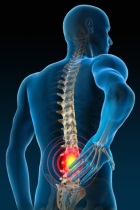Four out of five New Zealanders will suffer from Back Pain during their lifetime, costing ACC more than $300m per year and being the second most common cause of sick days off work.
 To help manage back pain:
To help manage back pain:
1. Talk to your GP: Back pain can have a wide variety of causes so go and see your GP about it.
2. Talk to a pharmacist before buying about over the counter anti-inflammatories and liniments: Voltaren and ibuprofen, Nurofen, Panadol and other pain medications can help tide you over until you get to the doctor. Talk to your pharmacist about what's best for you. Liniments like Voltaren Emugel, Deep Heat, Anti-Flamme can be a big help too.
3. Heat compresses and liniments: Hot water bottles, wheat bags, heat wraps and a hot bath or shower can all help relax the muscles and take the edge off the pain.
4. Stretches and exercises: If your back pain is the result of a repeat or old injury and a medical professional has shown you exercises that can help alleviate or remedy the source of the pain, then gently trying to do these on their advice is a good idea.
Back pain can occur at all ages, but ACC and Southern Cross and many other medical insurance sites say there are things you can do to look after your back and help prevent strains and injuries. Falls are another big cause of back pain and as we grow older, the annual risk of having one increases to one in three if you are over 65 years old, and one in two if you are aged 80 and over.
Two big factors that can help reduce those odds are:
1. Vitamin D:
ACC points out that "research has shown there is a clear association between low Vitamin D levels and reduced muscle strength, which contributes to many falls in older adults. Vitamin D is a proven way to enhance muscle strength, by increasing both the number and size of fast twitch (Type II) muscle fibres."
It can also help maintain bone density, by assisting calcium to be absorbed into the bones. This lessens the risk of fractures in those who do fall. Vitamin D supplements are widely used for fall prevention in many countries around the world, including the USA and the UK.
According to ACC, taking Vitamin D supplements appears to have no known side effects and can safely be done with most medications. However, as always talk to your doctor before embarking on a regular course of supplements so anything else you may be managing can be taken into account.
2. Safe exercise:
As well as building muscle strength, exercise helps maintain bone density as well as a host of other benefits so incorporating regular exercise into your life is always a good idea.









Join the Discussion
Type out your comment here:
You must be logged in to post a comment.